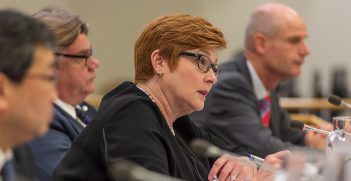Governing China’s Celebrities

China’s entertainment celebrities are indentured to aid the ruling Communist Party by regulatory frameworks and potential online public censure with follow-up industry and government action. These formal and informal controls prevent PRC celebrities from using their mediatised star power to wield oppositional political influence.
Celebrities are called “the power elite,” a “powerless elite” and “Big Citizens.” American film and sports stars arguably belong to a national power group of political, military, and corporate leaders and celebrities. Conversely, celebrities are a separate powerless elite when compared to political-military-corporate-religious leaders who influence the societies that they direct through institutional decision-making powers. But, nowadays, Big Citizen celebrities often use their mediatised “star power” to exercise unelected political influence through international humanitarian-philanthropic causes.
China’s celebrities are not members of the ruling power elite, but they are considered to be social role models and consequently have been indentured to serve the nation (and not act as independent Big Citizens). PRC regulatory frameworks promote cooperative public behaviors from celebrities who wish to keep their careers. Celebrity needs of maximum public visibility, combined with online public monitoring of celebrity activities, further encourages cooperative celebrity behaviors. The potential for regulatory and populist practices to coalesce ensures that China’s celebrities can remain in the public eye but are unable to exert oppositional political influence as per Western Big Citizens.
Regulating celebrities
Celebrities are indentured to aid the Communist Party through the PRC’s restructured media-communications system, which comes under Publicity (Propaganda) Department supervision, and supporting regulatory frameworks.
Controls over China’s cultural industries (news, publishing, copyright, radio, film, television, arts, internet, entertainment) are expanding along with PRC government plans to have the world’s biggest media and entertainment market. Unlike in Western societies, these industries are expected to advance socialist culture via products that promote government-endorsed national values and policy goals, support the PRC’s revolutionary history, counter negative (Western) cultural influences, and communicate a positive international image of China.
In 2018, three government-run broadcasters: China Central Television, China Radio International, and China National Radio, were merged into a state-media conglomerate called the Voice of China, managed by a new government organisation, the National Radio and Television Administration, and supervised by the Publicity Department. Other new organisations placed under Publicity Department supervision include the National Film Bureau, the State Press and Publication Administration, and the National Copyright Administration. The Publicity Department oversees domestic film production, content, distribution, and screening, as well as international joint productions, film importing, and exporting. The Cyberspace Administration of China exercises similar controls over internet businesses and content.
The first Film Industry Promotion Law of the PRC, effective 2017, outlines the government-identified rules of conduct for entertainment industry professionals. The law aims to assist the healthy development of the film industry, advance socialist core values, and enrich people’s cultural lives. The socialist core values are prosperity, democracy, civility, harmony, freedom, equality, justice, rule of law, patriotism, dedication, integrity, and friendship. These values emphasise civic mindedness rather than what is often presented as a return to old-school socialist morality.
The law urges film industry organisations to create self-discipline regulations to strengthen legal and professional ethics. It also encourages actors, directors, and other personnel to comply with Chinese law, respect social norms, abide by professional ethics, adopt self-discipline measures, and establish a positive social image.
As films in China can only be screened with a government release permit, the law requires industry professionals to manage their public personas and products, in line with government-endorsed values and policy objectives.
The 2021 draft Radio and Television Law is more explicit. The law encourages the broadcasting of content that supports socialism, China, national policies, and scientific/cultural innovation. Conversely, it bans content that belittles the Communist Party, socialism, revolutionary heroes and Chinese culture/history, as well as content that promotes misinformation, crime, violence, obscenity and illegality. The law states that radio/television practitioners shall abide by Chinese law and professional ethics and establish a positive social image. It further bans products by media producers/performers who have broken relevant laws and regulations. Such conditions are enforced through fines, product boycotts, and suspensions of business licenses.
These organisational and legislative changes provide a clear economic incentive for relevant industries to vet personnel in line with government directives to protect their businesses, and for performers to self-govern their public personas to protect their careers.
Harnessing public sentiment
Celebrities depend for their fame on positive audience sentiment, which is revokable. Hence the main informal mechanism governing China’s celebrities is “online supervision by public opinion” – an assemblage of populist, contingent practices characterised by praise or censure of celebrity behaviours, which can turn into industry and government action in particular circumstances.
The Management Measures for the Self-Discipline of Performers in the Performance Industries, issued in early 2021 by the China Association of Performing Arts (CAPA), a non-profit organisation, are illustrative. The Measures recap the legal-professional behaviors outlined in national laws, adding that non-compliant members and their products will be boycotted, and urging performers to join in public welfare activities.
Although these measures only cover voluntary members, CAPA has been vocal on social media about the need to boycott (non-member) celebrities for alleged criminal and “poor” behaviors, and the Communist Party media-mouthpiece, People’s Daily, has reposted the CAPA regulations and claims in efforts to shape netizen opinion. Commenting via its Weibo account on the arrest on suspicion of rape of Chinese Canadian popstar Kris Wu, People’s Daily affirmed that no celebrity is above the law and celebrities should be good (not bad) role models.
Also reposting the CAPA regulations and claims, People’s Daily criticised actor Zhang Zhehan for his ignorance of PRC revolutionary history. Zhang attracted public criticism in mid-2021 for posting photographs of himself at a Japanese shrine to war heroes (a Chinese symbol of war crimes).
Online controversy cost Zhang brand endorsements as businesses became anxious to reduced product sales given heightened expressions of public patriotism surrounding the Communist Party’s centenary celebrations. Media companies also removed his products from music-video sharing platforms in acts of industry self-censorship, designed to forestall potential government action.
Both examples signal a shift to proactive industry-professional self-regulation rather than reactive government censorship. They also illustrate government efforts to highlight regulatory frameworks and steer public opinion through the opportunistic medium of celebrity gossip.
Harnessing celebrity
Publicity Department oversight of the entertainment industries and new regulatory frameworks are indenturing celebrities to the service of government.
In the run-up to the Communist Party’s 2017 National Congress, China Central Television released a series of celebrity-endorsed public service advertisements (PSA) titled the Glory and the Dream—Our Chinese Dream. Thirty-plus celebrities, including A-listers Jackie Chan and Li Bingbing, appeared in the PSAs, which were shown on entertainment platforms across China. The PSAs endorsed major political slogans associated with Xi Jinping, including the Chinese Dream and socialist core values.
In 2019, the Publicity Department released PSAs endorsed by young popstars and actors promoting the socialist core values and China’s social credit system.
Recent regulations issued by the National Radio and Television Administration urge broadcasters to encourage performer participation in public welfare programs. Hence, PRC celebrities look set to become a feature of mediatised events promoting government-endorsed civic values rather than Big Citizen activism.
Elaine Jeffreys (PhD) is Professor in International Studies at the University of Technology Sydney. She is author, with Jian Xu, of ‘Indenturing celebrity: governing China’s entertainment industries’, Modern China.
Jian Xu (PhD) is Senior Lecturer in Communication at Deakin University, Australia. He is series editor of Asian Celebrity and Fandom Studies (Bloomsbury) and editor of Asian Celebrity Cultures and Digital Media (Hong Kong University Press, 2023).
This article is published under a Creative Commons License and may be republished with attribution.





